Axiomatic Read online
Page 8
The preliminary forensic report arrived, with nothing very useful. No evidence of a protracted struggle—no bruising, no skin or blood found under Macklenburg’s fingernails. Apparently she’d been taken entirely by surprise. The throat wound had been made by a thin, straight, razor-sharp blade, with a single powerful stroke.
There were five genotypes, besides Macklenburg’s and the chimera’s, present in hairs and flakes of dead skin found in the house. Precise dating isn’t possible, but all showed a broad range in the age of shedding, which meant regular visitors, friends, not strangers. All five had been in the kitchen at one time or another. Only Macklenburg and the chimera showed up in the basement in amounts that could not be accounted for by drift and second-party transport, while the chimera seemed to have rarely left her special room. One prevalent male had been in most of the rest of the house, including the bedroom, but not the bed—or at least not since the sheets had last been changed. All of this was unlikely to have a direct bearing on the murder; the best assassins either leave no biological detritus at all, or plant material belonging to someone else.
The interviewers’ report came in soon after, and that was even less helpful. Macklenburg’s next of kin was a cousin, with whom she had not been in touch, and who knew even less about the dead woman than I did. Her neighbours were all much too respectful of privacy to have known or cared who her friends had been, and none would admit to having noticed anything unusual on the day of the murder.
I sat and stared at The Caress.
Some lunatic with a great deal of money—perhaps connected to Lindhquist, perhaps not—had commissioned Freda Macklenburg to create the chimera to match the sphinx in the painting. But who would want to fake a burglary, murder Macklenburg, and endanger the chimera’s life, without making the effort to actually kill it?
The phone rang. It was Muriel. The chimera was awake.
* * *
The two officers outside had had a busy shift so far; one psycho with a knife, two photographers disguised as doctors, and a religious fanatic with a mail-order exorcism kit. The news reports hadn’t mentioned the name of the hospital, but there were only a dozen plausible candidates, and the staff could not be sworn to secrecy or immunised against the effect of bribes. In a day or two, the chimera’s location would be common knowledge. If things didn’t quieten down, I’d have to consider trying to arrange for a room in a prison infirmary, or a military hospital.
‘You saved my life.’
The chimera’s voice was deep and quiet and calm, and she looked right at me as she spoke. I’d expected her to be painfully shy, amongst strangers for perhaps the first time ever. She lay curled on her side on the bed, not covered by a sheet but with her head resting on a clean, white pillow. The smell was noticeable, but not unpleasant. Her tail, as thick as my wrist and longer than my arm, hung over the edge of the bed, restlessly swinging.
‘Dr. Beatty saved your life.’ Muriel stood at the foot of the bed, glancing regularly at a blank sheet of paper on a clipboard. ‘I’d like to ask you some questions.’ The chimera said nothing to that, but her eyes stayed on me. ‘Could you tell me your name, please?’
‘Catherine.’
‘Do you have another name? A surname?’
‘No.’
‘How old are you, Catherine?’ Primed or not, I couldn’t help feeling a slight giddiness, a sense of surreal inanity to be asking routine questions of a sphinx plucked from a nineteenth-century oil painting.
‘Seventeen.’
‘You know that Freda Macklenburg is dead?’
‘Yes.’ Quieter, but still calm.
‘What was your relationship with her?’
She frowned slightly, then gave an answer which sounded rehearsed but sincere, as if she had long expected to be asked this. ‘She was everything. She was my mother and my teacher and my friend.’
Misery and loss came and went on her face, a flicker, a twitch.
‘Tell me what you heard, the day the power went off.’
‘Someone came to visit Freda. I heard the car, and the doorbell. It was a man. I couldn’t hear what he said, but I could hear the sound of his voice.’
‘Was it a voice you’d heard before?’
‘I don’t think so.’
‘How did they sound? Were they shouting? Arguing?’
‘No. They sounded friendly. Then they stopped, it was quiet. A little while after that, the power went off. Then I heard a truck pull up, and a whole lot of noise—footsteps, things being shifted about. But no more talking. There were two or three people moving all around the house for about half an hour. Then the truck and the car drove away. I kept waiting for Freda to come down and tell me what it had all been about.’
I’d been thinking a while how to phrase the next question, but finally gave up trying to make it polite.
‘Did Freda ever discuss with you why you’re different from other people?’
‘Yes.’ Not a hint of pain, or embarrassment. Instead, her face glowed with pride, and for a moment she looked so much like the painting that the giddiness hit me again. ‘She made me this way. She made me special. She made me beautiful.’
‘Why?’
That seemed to baffle her, as if I had to be teasing. She was special. She was beautiful. No further explanation was required.
I heard a faint grunt from just outside the door, followed by a tiny thud against the wall. I signalled to Muriel to drop to the floor, and to Catherine to keep silent, then—quietly as I could, but with an unavoidable squeaking of metal—I climbed on to the top of a wardrobe that stood in the corner to the left of the door.
We were lucky. What came through the door when it opened a crack was not a grenade of any kind, but a hand bearing a fan laser. A spinning mirror sweeps the beam across a wide arc—this one was set to one hundred and eighty degrees, horizontally. Held at shoulder height, it filled the room with a lethal plane about a metre above the bed. I was tempted to simply kick the door shut on the hand the moment it appeared, but that would have been too risky; the gun might have tilted down before the beam cut off. For the same reason, I couldn’t simply burn a hole in the man’s head as he stepped into the room, or even aim at the gun itself—it was shielded, and would have borne several seconds’ fire before suffering any internal damage. Paint on the walls was scorched and the curtains had split into two burning halves; in an instant he would lower the beam on to Catherine. I kicked him hard in the face, knocking him backwards and tipping the fan of laser light up towards the ceiling. Then I jumped down and put my gun to his temple. He switched off the beam and let me take the weapon from him. He was dressed in an orderly’s uniform, but the fabric was implausibly stiff, probably containing a shielding layer of aluminium-coated asbestos (with the potential for reflections, it’s unwise to operate a fan laser with any less protection).
I turned him over and cuffed him in the standard way—wrists and ankles all brought together behind the back, in bracelets with a sharpened inner edge that discourages (some) attempts to burst the chains. I sprayed sedative on his face for a few seconds, and he acted like it had worked, but then I pulled open one eye and knew it hadn’t. Every cop uses a sedative with a slightly different tracer effect; my usual turns the whites of the eyes pale blue. He must have had a barrier layer on his skin. While I was preparing an IV jab, he turned his head towards me and opened his mouth. A blade flew out from under his tongue and nicked my ear as it whistled past. That was something I’d never seen before. I forced his jaw open and had a look; the launching mechanism was anchored to his teeth with wires and pins. There was a second blade in there; I put my gun to his head again and advised him to eject it on to the floor. Then I punched him in the face and started searching for an easy vein.
He gave a short cry, and began vomiting steaming-hot blood. Possibly his own choice, but more likely his employers had decided to cut their losses. The body started smoking, so I dragged it out into the corridor.
The officers who’d been
on guard were unconscious, not dead. A matter of pragmatism; chemically knocking someone senseless is usually quieter, less messy and less risky to the assailant than killing them. Also, dead cops have been known to trigger an extra impetus in many investigations, so it’s worthwhile taking the trouble to avoid them. I phoned someone I knew in Toxicology to come and take a look at them, then radioed for replacements. Organising the move to somewhere more secure would take twenty-four hours at least.
Catherine was hysterical, and Muriel, pretty shaken herself, insisted on sedating her and ending the interview.
Muriel said, ‘I’ve read about it, but I’ve never seen it with my own eyes before. What does it feel like?’
‘What?’
She emitted a burst of nervous laughter. She was shivering. I held on to her shoulders until she calmed down a little. ‘Being like that.’ Her teeth chattered. ‘Someone just tried to kill us all, and you’re carrying on like nothing special happened. Like someone out of a comic book. What does it feel like?’
I laughed myself. We have a standard answer.
‘It doesn’t feel like anything at all.’
* * *
Marion lay with her head on my chest. Her eyes were closed, but she wasn’t asleep. I knew she was still listening to me. She always tenses up a certain way when I’m raving.
‘How could anyone do that? How could anyone sit down and coldbloodedly plan to create a deformed human being with no chance of living a normal life? All for some insane “artist” somewhere who’s keeping alive a dead billionaire’s crazy theories. Shit, what do they think people are? Sculptures? Things they can mess around with any way they like?’
I wanted to sleep, it was late, but I couldn’t shut up. I hadn’t even realised how angry I was until I’d started on the topic, but then my disgust had grown more intense with every word I’d uttered.
An hour before, trying to make love, I’d found myself impotent. I’d resorted to using my tongue, and Marion had come, but it still depressed me. Was it psychological? The case I was on? Or a side effect of the priming drugs? So suddenly, after all these years? There were rumours and jokes about the drugs causing almost everything imaginable: sterility, malformed babies, cancer, psychoses; but I’d never believed any of that. The union would have found out and raised hell, the department would never have been allowed to get away with it. It was the chimera case that was screwing me up, it had to be. So I talked about it.
‘And the worst thing is, she doesn’t even understand what’s been done to her. She’s been lied to from birth. Macklenburg told her she was beautiful, and she believes that crap, because she doesn’t know any better.’
Marion shifted slightly, and sighed. ‘What’s going to happen to her? How’s she going to live when she’s out of hospital?’
‘I don’t know. I guess she could sell her story for quite a packet. Enough to hire someone to look after her for the rest of her life.’ I closed my eyes. ‘I’m sorry. It’s not fair, keeping you awake half the night with this.’
I heard a faint hissing sound, and Marion suddenly relaxed. For what seemed like several seconds, but can’t have been, I wondered what was wrong with me, why I hadn’t leapt to my feet, why I hadn’t even raised my head to look across the dark room to find out who or what was there.
Then I realised the spray had hit me, too, and I was paralysed. It was such a relief to be powerless that I slipped into unconsciousness feeling, absurdly, more peaceful than I had felt for a very long time.
* * *
I woke with a mixture of panic and lethargy, and no idea where I was or what had happened. I opened my eyes and saw nothing. I flailed about trying to touch my eyes, and felt myself drifting slightly, but my arms and legs were restrained. I forced myself to relax for a moment and interpret my sensations. I was blindfolded or bandaged, floating in a warm, buoyant liquid, my mouth and nose covered with a mask. My feeble thrashing movements had exhausted me, and for a long time I lay still, unable to concentrate sufficiently to even start guessing about my circumstances. I felt as if every bone in my body had been broken—not through any pain, but through a subtler discomfort arising from an unfamiliar sense of my body’s configuration; it was awkward, it was wrong. It occurred to me that I might have been in an accident. A fire? That would explain why I was floating; I was in a burns treatment unit. I said, ‘Hello? I’m awake.’ The words came out as painful, hoarse whispers.
A blandly cheerful voice, almost genderless but borderline male, replied. I was wearing headphones; I hadn’t noticed them until I felt them vibrate.
‘Mr Segel. How do you feel?’
‘Uncomfortable. Weak. Where am I?’
‘A long way from home, I’m afraid. But your wife is here too.’
It was only then that I remembered: lying in bed, unable to move. That seemed impossibly long ago, but I had no more recent memories to fill in the gap.
‘How long have I been here? Where’s Marion?’
‘Your wife is nearby. She’s safe and comfortable. You’ve been here a number of weeks, but you are healing rapidly. Soon you’ll be ready for physiotherapy. So please, relax, be patient.’
‘Healing from what?’
‘Mr Segel, I’m afraid it was necessary to perform a great deal of surgery to adjust your appearance to suit my requirements. Your eyes, your face, your bone structure, your build, your skin tones; all needed substantial alteration.’
I floated in silence. The face of the diffident youth in The Caress drifted across the darkness. I was horrified, but my disorientation cushioned the blow; floating in darkness, listening to a disembodied voice, nothing was yet quite real.
‘Why pick me?’
‘You saved Catherine’s life. On two occasions. That’s precisely the relationship I wanted.’
‘Two set-ups. She was never in any real danger, was she? Why didn’t you find someone who already looked the part, to go through the motions?’ I almost added ‘Gustave’, but stopped myself in time. I was certain he intended killing me anyway, eventually, but betraying my suspicions about his identity would have been suicidal. The voice was synthetic, of course.
‘You genuinely saved her life, Mr Segel. If she’d stayed in the basement without replacement hormones, she would have died. And the assassin we sent to the hospital was seriously intent on killing her.’
I snorted feebly. ‘What if he’d succeeded? Twenty years’ work and millions of dollars, down the drain. What would you have done then?’
‘Mr Segel, you have a very parochial view of the world. Your little town isn’t the only one on the planet. Your little police force isn’t unique either, except in being the only one who couldn’t keep the story from the media. We began with twelve chimeras. Three died in childhood. Three were not discovered in time after their keepers were killed. Four were assassinated after discovery. The other surviving chimera’s life was saved by different people on the two occasions—and also she was not quite up to the standard of morphology that Freda Macklenburg achieved with Catherine. So, imperfect as you are, Mr Segel, you are what I am required to work with.’
* * *
Shortly after that, I was shifted to a normal bed, and the bandages were removed from my face and body. At first the room was kept dark, but each morning the lights were turned up slightly. Twice a day, a masked physiotherapist with a filtered voice came and helped me learn to move again. There were six armed, masked guards in the windowless room at all times; ludicrous overkill unless they were there in case of an unlikely, external attempt to rescue me. I could barely walk; one stern grandmother could have kept me from escaping.
They showed me Marion, once, on closed-circuit TV. She sat in an elegantly furnished room, watching a news disk. Every few seconds, she glanced around nervously. They wouldn’t let us meet. I was glad. I didn’t want to see her reaction to my new appearance; that was an emotional complication I could do without.
As I slowly became functional, I began to feel a deep sense of panic that
I’d yet to think of a plan for keeping us alive. I tried striking up conversations with the guards, in the hope of eventually persuading one of them to help us, either out of compassion or on the promise of a bribe, but they all stuck to monosyllables, and ignored me when I spoke of anything more abstract than requests for food. Refusing to cooperate in the ‘realisation’ was the only strategy I could think of, but for how long would that work?
I had no doubt that my captor would resort to torturing Marion, and if that failed he would simply hypnotise or drug me to ensure that I complied. And then he would kill us all: Marion, myself, and Catherine.
I had no idea how much time we had; neither the guards, nor the physiotherapist, nor the cosmetic surgeons who occasionally came to check their handiwork, would even acknowledge my questions about the schedule being followed. I longed for Lindhquist to speak with me again; however insane he was, at least he’d engaged in a two-way conversation. I demanded an audience with him, I screamed and ranted; the guards remained as unresponsive as their masks.
Accustomed to the aid of the priming drugs in focusing my thoughts, I found myself constantly distracted by all kinds of unproductive concerns, from a simple fear of death, to pointless worries about my chances of continued employment, and continued marriage, if Marion and I did somehow survive. Weeks went by in which I felt nothing but hopelessness and self-pity. Everything that defined me had been taken away: my face, my body, my job, my usual modes of thought. And although I missed my former physical strength (as a source of self-respect rather than something that would have been useful in itself), it was the mental clarity that had been so much a part of my primed state of mind that, I was certain, would have made all the difference if only I could have regained it.
I eventually began to indulge in a bizarre, romantic fantasy: the loss of everything I had once relied on—the stripping away of the biochemical props that had held my unnatural life together—would reveal an inner core of sheer moral courage and desperate resourcefulness which would see me through this hour of need. My identity had been demolished, but the naked spark of humanity remained, soon to burst into a searing flame that no prison walls could contain. That which had not killed me would (soon, real soon) make me strong.

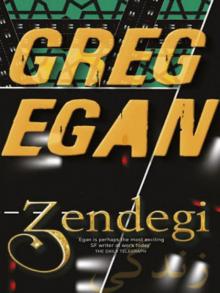 Zendegi
Zendegi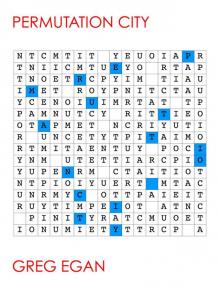 Permutation City
Permutation City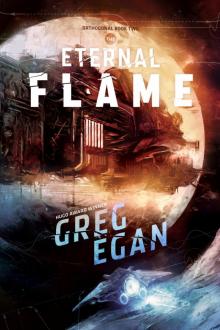 The Eternal Flame
The Eternal Flame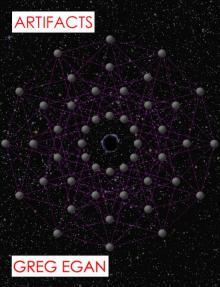 Artifacts
Artifacts Wang's Carpets
Wang's Carpets Dichronauts
Dichronauts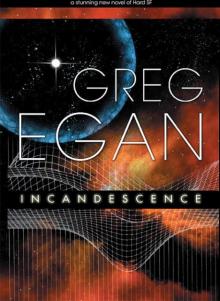 Incandescence
Incandescence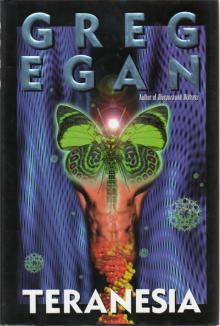 Teranesia
Teranesia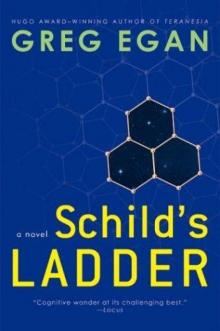 Schild's Ladder
Schild's Ladder Quarantine
Quarantine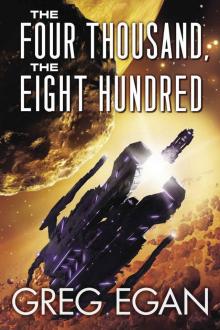 The Four Thousand, the Eight Hundred
The Four Thousand, the Eight Hundred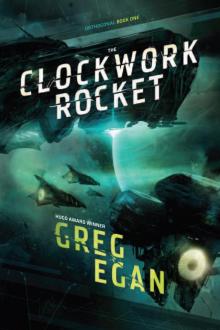 The Clockwork Rocket
The Clockwork Rocket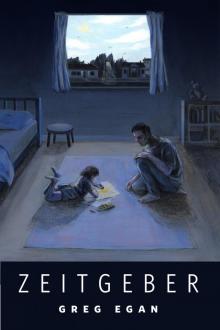 Zeitgeber
Zeitgeber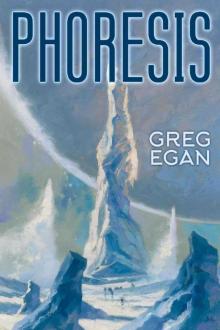 Phoresis
Phoresis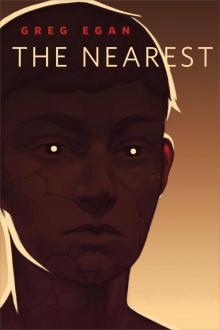 The Nearest
The Nearest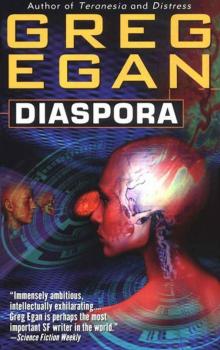 Diaspora
Diaspora Instantiation
Instantiation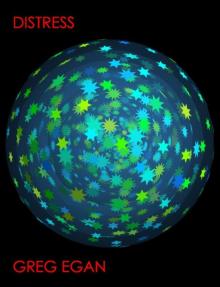 Distress
Distress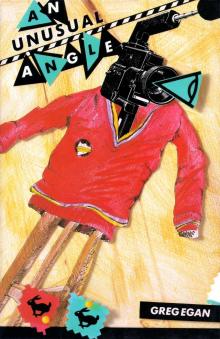 An Unusual Angle
An Unusual Angle Oceanic
Oceanic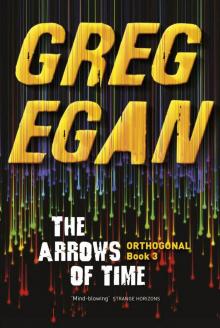 The Arrows of Time
The Arrows of Time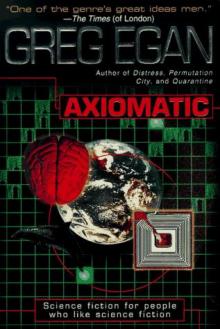 Axiomatic
Axiomatic![Anthology 2. Luminous [1998, 2010] Read online](http://i1.bookreadfree.com/i/03/18/anthology_2_luminous_1998_2010_preview.jpg) Anthology 2. Luminous [1998, 2010]
Anthology 2. Luminous [1998, 2010]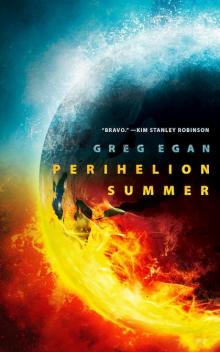 Perihelion Summer
Perihelion Summer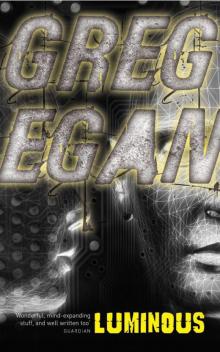 Luminous
Luminous